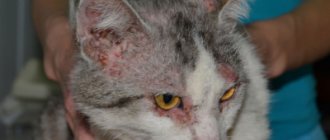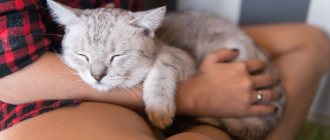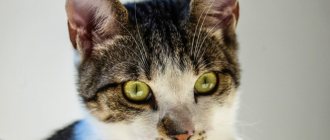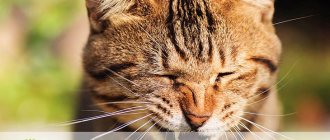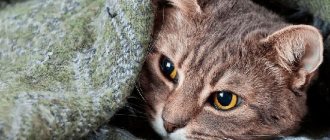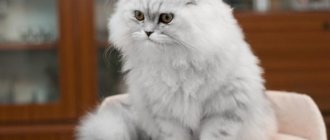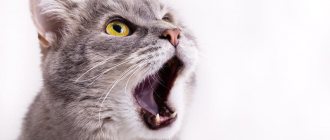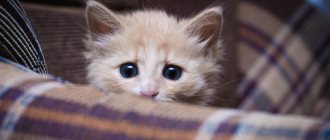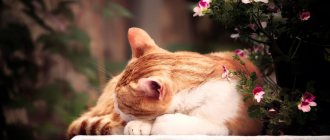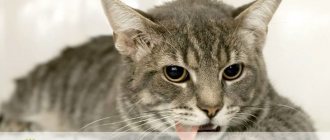Teeth grinding is different from the up and down motion of cats when they chew their food. It is easy to detect because it sounds like a clicking or knocking sound when the cat's jaw moves from side to side.
Teeth grinding in cats (bruxism) is often a symptom of dental problems. Any dental problem that causes oral pain or jaw dislocation can cause your cat to grind her teeth. Other painful problems that cause a cat to grind their teeth include irritable bowel syndrome, neurological problems, liver disease and kidney failure.
In cats, teeth grinding is not a tic, but rather a symptom of an underlying problem. Bruxism in cats is often a sign that the cat is in pain. Teeth grinding is common but not normal, so the cause must be identified and addressed.
Resorption of cat teeth
If your cat is constantly clicking or chattering his lower jaw, it may be due to severe pain caused by the cat's teeth resolving.
Tooth resorption in cats is the most common oral disease, affecting 30 to 40 percent of healthy adult cats and 60 to 80 percent of kittens. Persians and Siamese are the most susceptible to this disease. The exact cause of tooth resorption in cats is unknown.
Tooth resorption is the progressive loss of a tooth (or teeth) caused by cells called odontoclasts. Tooth erosion begins on the dentin and cementum (outside the tooth at the gum line) and usually occurs on the mandibular premolar teeth. However, any tooth is at risk.
As the tooth decays, it eventually breaks, resulting in the loss of the entire tooth and its root. Your veterinarian may prescribe pain medications and antibiotics to treat this condition.
© shutterstock
How is the treatment carried out?
Surgical intervention
Timely vaccination and deworming can protect your pet from dangerous diseases that cause jaw clicking.
Surgery is necessary for purulent-inflammatory process of the jaw. The cavity is opened, pus is removed, drainage is performed, and the wound is cleaned. For osteomyelitis, a sequestrotomy is performed to remove dead areas of bone, periosteum and bone marrow. In case of displaced or open fractures of the jaw, the broken fragments are fastened with metal synthesis instruments.
Drug therapy
The treatment regimen is determined by the doctor based on the etiology of the disease. Rabies is incurable because it is quickly fatal. For tetanus, antitetanus serum is administered, and anticonvulsants are recommended. Purulent-inflammatory processes are treated with antibiotics, which are prescribed by a veterinarian after identifying the pathogen. For helminthic infestations, anthelmintic drugs are effective, and vitamin-mineral complexes are effective to strengthen the body. It is also recommended to cure concomitant kidney diseases.
Source
Gingivitis
Gingivitis, also known as inflammatory gum disease or periodontal disease, affects 70 percent of cats aged 3 years and older. The chance of gingivitis increases by 20 percent every year a cat is alive.
According to the Journal of Nutrition, the accumulation of bacteria and plaque on the surface of teeth is the most common cause of gum disease.
Inflammatory gum disease often begins with inflammation of one tooth. When the lining of your cat's mouth becomes inflamed due to gingivitis, it can cause pain and result in your cat grinding her teeth. Gingivitis can affect some or all of a cat's deep tooth supporting structures.
If left untreated, complications caused by inflammatory gum disease can be irreversible. According to the Journal of Veterinary Dentistry, these include severe inflammation, tartar below the gum line, gum recession, missing teeth, bleeding and pus from the gums, significant bone loss and permanent tooth loss.
What to do
The least dangerous situation is if the grinding and clicking of the tongue is associated with the appearance of tartar. In this case, professional cleaning is carried out to eliminate the cause of unpleasant symptoms and sounds. You can also improve the condition of teeth with periodontal disease.
In order to sanitize the oral cavity, clean it of bacteria and harmful microorganisms, you need to wipe the cat’s mouth with a solution of chlorhexidine and furatsilin once every six months. Metrogyl gel is also used for such purposes.
But if the sounds are caused by diseases, you need to immediately begin examination, diagnosis, and treatment. A biochemical blood test is required to show the presence of renal or liver failure or other diseases. You should not delay the process, as every day the pet’s condition worsens and the disease becomes more advanced.
Tooth fractures
If you've seen a cat play, you know that it will put anything in its mouth. This can lead to dental trauma and tooth fractures. Tooth fractures are painful and can lead to teeth grinding.
Most often, the upper canines of cats break. When a cat bites a hard object or applies too much pressure with its teeth, the canine can crack.
Cats also like to perch and climb onto high surfaces. Unfortunately, cats don't fall on their feet all the time. If a cat jumps from a high surface and hits its head when landing, it may have one or more broken teeth.
Feline stomatitis
Feline stomatitis is an oral disease that causes painful sores on the gums and lining of the mouth. Cats by nature tend to hide their pain. However, the pain from this condition can be so severe that it causes them to scream while opening their mouth.
Behavioral changes are the first signs owners notice of feline stomatitis because mouth sores and inflammation are not always obvious. Your hungry cat may approach her food bowl, only to hiss at it and run away. Veterinarians call this behavior "approach avoidance" because the cat expects eating the food to be painful.
According to Veterinary Clinics of North America: Small Animal Practice, stomatitis in cats is considered autoimmune. The immune system overreacts to plaque, causing severe inflammation in the mouth. Ulcers and inflammation can also occur in the throat, as well as in the underlying bone of the mouth, where infection is likely.
How to accurately determine the cause
To reliably determine why a cat’s teeth grind, the animal must be shown to a veterinarian.
Diagnosis begins with a visual examination by a specialist and collection of anamnesis.
Pathologies of the gums and teeth can be determined using x-ray or ultrasound.
To establish an accurate diagnosis, a blood test for biochemistry and a urine test are performed.
It is important to make an accurate diagnosis; the correct treatment and elimination of symptoms depend on this.
Malocclusion and TMJ
Misalignment of teeth (bad bite) results in grinding or friction between the upper and lower teeth. This is commonly seen in brachycephalic, flat-faced breeds such as Persians. Because of their short faces, their teeth do not grow straight.
Siamese cats are also at risk because their long, pointed faces can cause the upper canines to move too far forward, causing an overbite.
Some cats may suffer from a condition called extrusion, where their canines grow abnormally long. This can also lead to squeaking. Poorly aligned teeth cause a shift in the movement of the jaw joint, causing teeth grinding and temporomandibular joint pain.
Although TMJ is not considered an oral structure, it is one of the most common reasons why cats grind their teeth. The temporomandibular joint is a hinge joint where the jaw attaches to the skull. There are two temporomandibular joints on each side of the face that work simultaneously to allow the jaw to move.
© shutterstock
Any TMJ problem will cause pain when the cat tries to open and close its mouth. Temporomandibular joint pain not only makes it difficult to move the mouth, but can also interfere with chewing and cause loss of appetite in cats.
If your cat does not have dental problems, your veterinarian may order blood and urine tests. Talk to your veterinarian about consulting a qualified chiropractor to evaluate your cat's TMJ condition.
Oral cancer
Squamous cell carcinoma is the most common form of oral cancer in cats. Middle-aged and older cats are at greater risk, but it has been seen in younger cats as well.
Carcinomas grow very quickly and often invade nearby tissue and bone. Common signs and symptoms include:
- Grinding of teeth
- Drooling
- Bad breath
- Loose teeth
- Growth in the mouth
- Swollen face
- Swelling in the neck or under the jaw
- Bleeding from the mouth
- Weight loss
The exact reason is unknown. However, veterinary pathology suggests that secondhand smoke may be associated with squamous cell carcinoma in cats.
Stress and anxiety
Bruxism usually occurs as a result of an underlying oral or gastrointestinal disorder. Although causes such as stress and anxiety are less common, they can be contributing factors. Cats living with unfriendly or dominant felines have been reported to grind their teeth.
Stress can also be caused by oral masses, ulcerations, broken teeth, gastrointestinal problems and malocclusions due to the severe pain associated with these problems. Therefore, it is impossible to confirm whether a sick cat's teeth grinding is due to pain or stress caused by it.
Why do cats purr?
Rumbling is an unusual sound characteristic of cats, and it is not entirely clear how they produce it. It's not just domestic cats that purr; many species of large felines are also capable of generating vibrations at sound frequencies.
This ability is associated with caring for kittens. When the mother returns to the den and quietly purrs (so as not to attract the attention of predators) she signals that everything is in order, and the kittens, in turn, suck milk and purr at the same time.
Cats also purr when sick or injured. There are various theories explaining this feature; the frequency of sound in sick animals differs from the frequency of rumbling in healthy ones. It is possible that such purring may have healing properties or serve as a way of self-soothing when the cat feels more vulnerable.
Rumbling is an unusual sound characteristic of cats, and it is not entirely clear how they produce it. It's not just domestic cats that purr; many species of large felines are also capable of generating vibrations at sound frequencies.
This ability is associated with caring for kittens. When the mother returns to the den and purrs quietly (so as not to attract the attention of predators) she signals that everything is in order, and the kittens, in turn, suckle milk and purr at the same time.
Acid reflux
Acid reflux is the uncontrolled upward flow of stomach acid into the tube connecting the stomach and throat. Acid reflux is common in cats and can occur at any age. However, young cats are most at risk.
Cats often swallow acid several times to clear their mouth and throat. This can lead to teeth grinding.
Gastric juices contain stomach acid, bile salts, pepsin and other substances that can damage the protective lining of the esophagus. This results in mild to severe inflammation of the lining of the esophagus, causing pain and discomfort.
© shutterstock
Food
Teeth grinding is usually associated with mouth pain. So if your cat has gum problems, sensitive teeth, or mouth pain, dry food may make your cat's condition worse, causing your cat to grind her teeth. To avoid anorexia in your cat, avoid dry food and offer only wet food until you can see a veterinarian.
Dental problems can occur due to a diet rich in grains. Make sure you feed your cat a high-quality, high-protein, zero-grain diet that is rich in vitamins and minerals.
Stressful state
It is common for all living beings to clench their teeth when under stress . People close their jaws and clench their fists not because they are preparing for a fight, but because it is a reflex. All muscles tense, as if compressed, adrenaline enters the blood, and the brain does everything to ensure survival. In this regard, our pets are not much different from people, only stressed teeth grinding most often manifests itself as a delayed reaction.
Neurological disorders
Neurological disorders such as absence seizures or focal seizures can manifest as teeth grinding in cats.
Seizures occur when the cerebral cortex does not function normally. The body reacts to this abnormal brain function by losing voluntary function, resulting in severe body shaking.
If your cat is having a focal seizure, she will scream loudly as if she is in pain. Even if your cat is not aggressive, she may act hostile. Other symptoms include excessive drooling and general atypical behavior. Some cats may feel like they are chewing (or grinding their teeth) and/or lose function of one leg.
Absence seizure, or petit mal seizure, in cats is a mild seizure that causes a brief loss of consciousness. The cat may appear to be looking into space. During a seizure, your cat may grind its teeth.
Dehydration
Dehydration increases stomach acid, causing acid reflux. Acid reflux is a common cause of bruxism.
When a cat is dehydrated, it will exhibit a number of symptoms, including sunken eyes and lethargy. A classic sign of dehydration in cats is skin tension. When you pinch a cat's shoulders, it will remain standing if it is dehydrated. Dehydration in cats is a serious problem that requires immediate attention from a veterinarian.
Most oral diseases associated with teeth grinding can be diagnosed by examining your cat's mouth. In some cases, X-rays, CT scans, and magnetic resonance imaging may be needed to determine the exact cause. If the disease occurs outside the mouth, your veterinarian may order other tests, such as blood tests, to diagnose your pet's condition.
Keep in mind that since teeth grinding is almost always associated with pain, your cat's treatment plan will also include pain management. If an infection is detected, antibiotics may be prescribed.
Article Author: Richard Parker I'm Richard, I have experience in all matters related to feline health, behavior, grooming techniques and general pet care. Richard graduated with a degree in journalism in 2008. He is the proud owner of 5 adult cats (all adopted stray breeds), including an older cat who is now 20 years old.
Diagnostics
It is important to conduct a thorough examination as some causes of dysphagia may be detected. Your veterinarian may recommend the following tests:
- Complete examination of the oral cavity under anesthesia
- General blood analysis
- Blood chemistry
- Analysis of urine
- X-ray of mouth, skull, teeth and neck
- Chest X-ray if your pet is coughing
Additional studies may also be prescribed, such as:
- Ultrasound of the throat
- Pharyngoscopy (examination of the throat using a special mirror)
- Barium fluoroscopy
- Myanesthenia blood test, to detect sore muscles responsible for chewing or other autoimmune disorders
- Hormone analysis
- Electrodiagnostic studies
- Biopsy and cytology of tumors and cysts

